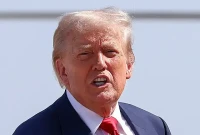Lesotho’s textile industry, a cornerstone of its economy, is facing an unprecedented crisis following the United States’ imposition of a 50% tariff on its exports. This decision has sent shockwaves through the nation, threatening the livelihoods of thousands and jeopardizing a sector that contributes significantly to the country’s GDP.
The U.S. administration’s move, announced in April 2025, has led to immediate repercussions. Major American buyers have halted new orders, and production lines in Lesotho’s garment factories have ground to a halt. Factories such as Lesotho Precious Garments (PTY) Ltd and Maseru E-Textiles (PTY) Ltd are contemplating temporary shutdowns, with the possibility of permanent closures looming if the tariffs remain in place.
The textile sector is Lesotho’s largest private employer, providing jobs to approximately 40,000 individuals. The abrupt decline in orders has resulted in mass layoffs, with workers, predominantly women, facing economic uncertainty. The United Textile Employees Union (UNITE) has expressed grave concern, warning that up to 20,000 jobs could be at risk if the situation persists.
Economists and industry leaders have criticized the U.S. tariffs as disproportionate, given Lesotho’s minimal contribution to the U.S. trade deficit. The tariffs threaten to dismantle a sector that has been a significant source of employment and economic activity for the nation.
In response to the crisis, the Lesotho government has declared a national state of disaster, aiming to expedite job creation in other sectors such as construction and agriculture. However, these efforts may not be sufficient to offset the immediate and long-term impacts of the tariffs on the textile industry.
The situation has also strained diplomatic relations between Lesotho and the United States. Despite attempts by Lesotho’s trade officials to engage in dialogue, the U.S. administration has yet to provide a clear path forward, leaving the future of Lesotho’s textile exports uncertain.
As the deadline for the temporary suspension of the tariffs approaches, the urgency for a resolution intensifies. The survival of Lesotho’s textile industry—and the economic stability of the nation—hinge on the outcome of ongoing negotiations and the potential for policy adjustments by the U.S. government.











This is a tough situation for Lesotho. Do you think the government should step in to support the textile industry?
I cant believe the U.S. is imposing such high tariffs on Lesotho! What will happen to those 40,000 jobs? This is a disaster.
Wow, this tariff situation is rough. Do you think Lesotho can find new markets to save those jobs? So sad.
This is a tough situation for Lesothos textile industry. Do you think the government should step in to save those jobs?
This is such a tough situation for Lesothos textile workers. Do you think there could be any alternative solutions to this tariff issue?
Why should Lesotho suffer due to U.S. tariffs? Isnt there a better way to protect domestic industries without harming others? #TradeIssues
What a mess! Shouldnt the focus be on helping those 40,000 workers instead of imposing tariffs? Priorities, people!